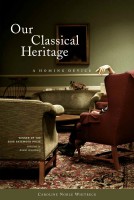

Reviews
Our Classical Heritage: A Homing Device
by Caroline Noble Whitbeck
 Our Classical Heritage: A Homing Device by Caroline Noble Whitbeck
Our Classical Heritage: A Homing Device by Caroline Noble Whitbeck
Switchback Books 2007; 73 pages; $14
ISBN 978-0-9786172-1-9, Paper
http://www.switchbackbooks.com
by Kristina Marie Darling
Chosen by Arielle Greenberg as winner of last year's Gatewood Prize, Caroline Noble Whitbeck's Our Classical Heritage: A Homing Device combines the feminine with the fragmented, offering a complex vision of American girlhood. Stylistically compelling in her unconventional uses of diction and syntax, Whitbeck's poetry creates its own worlds from hand-dryers and "glitterstick eyeliner," presenting readers with a fun, quirky rhythms throughout. Often exploring the transition from adolescence to adult life, Whitbeck's debut proves to be a delightful match-up of form and content, using stylistic devices to convey both the aesthetic enchantments and the contradictions inherent in contemporary adolescence.
At the start of the collection, for instance, Whitbeck's collage-like uses of imagery and syntax establish memory as eclectic, a theme that resurfaces throughout the book. Exemplified by her poem "OK," Whitbeck fragments both her prose and her stylistic approach, a formal decision that mirrors the speaker's search for coherence in the kitsch and knick-knacks of the poem. She writes in Our Classical Heritage: A Homing Device:
Bare velvet box windup ballerina sometime Ma lay off I mean it.
Greenstain on the chiffon from the pickup bed by the power plant
bottleneck cough I'll show you a Big Dipper guffaw. Pass it will you
wilting carnation. White ghost arc of the Wiffle ball socked between stuff
of boys restless in rented-out. Girls older than their novelty IDs. All.
Pairing high diction with more colloquial phrases, Whitbeck creates a narrative voice that is at once overtly confident and utterly disjointed, suggesting that the relationship between oneself and one's memories remains complex. Just as the "windup ballerina" and "wilting carnation" in the poem offer tangible mementoes for the speaker, both the story that she attaches to them and the voice in which it is told remain discontinuous. For Whitbeck, memory is the "Wiffle ball socked between stuff of boys," a confusing tangle from which the speaker must assemble her life and loves.
This stylistic approach interacts well with the repeated themes and motifs in the text, particularly the narrator's transition from girlhood to womanhood. Often pairing traditionally feminine imagery with darker subject matter, Whitbeck suggests that adolescence proves at once frivolous and gravely serious, dazzling readers with her syntactic feats throughout. Her poem "Teenagers Star in the Story of Their Lives, Painful Details and All" exemplifies this trend. She writes, for example:
backlit
yearbook
scrawl stuffed hound
abed with
the balled slamnote
scrutiny steam the
bathroom aplomb doleful
my Adderall my adorable rub
of Jansport rote locker
territorialities
excelsior cancer
Presenting "yearbooks" and "lockers" alongside "Adderall" and "cancer," Whitbeck hints at the less picturesque side of childhood, which often resembles the heavier burdens of adult life. As the poem's speaker grows older, marrying and starting a family of her own, this life proves no less substantial than those of the adolescent narrator, whose cares often prove too old for her age. Narrated in an eclectic style that embodies such contradictions, Whitbeck's poems prove at once challenging and compelling in their presentation of their speakers' coming of age.
Our Classical Heritage: A Homing Device is an accomplished debut. Using "pin-curls" and "still-wet lacquer," Whitbeck raises significant questions about poetics and American youth culture, a project that remains thought-provoking throughout.
Kristina Marie Darling is a graduate of Washington University in St. Louis. She is the author of five chapbooks, which include Fevers and Clocks (March Street Press, 2006) and The Traffic in Women (Dancing Girl Press, 2006). A Pushcart Prize nominee in 2006, her poems, reviews, and essays have appeared or are forthcoming in many journals, which include Janus Head, Rattle, The Mid-America Poetry Review, Rain Taxi, The Adirondack Review, The Main Street Rag, Tarpaulin Sky, CutBank, The Mid-American Review, Jacket, Redactions: Poetry and Poetics, and others. Recent awards include residencies from the Centrum Foundation and the Mary Anderson Center for the Arts.